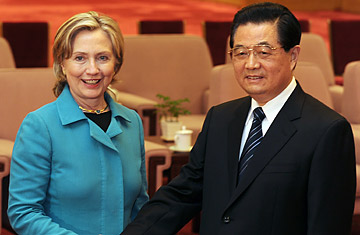
US Secretary of State Hillary Clinton meets with Chinese President Hu Jintao at the Great Hall of the People in Beijing, China.
A week after announcing a uranium-swap agreement with Turkey and Brazil, Iran on Monday formally submitted the proposal to the International Atomic Energy Agency (IAEA) in Vienna — and in doing so, as Tehran sees it, put the proverbial ball back in the court of the U.S. and its allies. But Washington preempted Iran's latest gambit the same day, by announcing a new package of U.N. sanctions to be presented to the Security Council with the all-important backing of China. Beijing had previously been the key obstacle to adopting new sanctions, insisting that such measures would be counterproductive and demanding that all sides go the extra mile to find a solution through dialogue. Judging by their reactions until now, the Chinese might have been expected to respond to the Turkey-Brazil-Iran proposal by demanding that any discussion of sanctions be postponed until the potential of the confidence-building mechanism had been tested. Instead, it backed the U.S., saying the onus was on Iran to do more to satisfy international concerns over the intent of its nuclear program. So what changed?
Analyst Peter Lee points out that the Chinese are claiming, through commentaries in official publications, that Beijing extracted a significant price for its support. Not only has Beijing watered down the sanctions to be adopted by the Security Council in order to ensure they don't restrain China from expanding its already massive economic ties with Iran; Chinese analysts also claim that, in the course of a protracted series of negotiations with Washington, their government also won undertakings from Washington to exempt Chinese companies from any U.S. unilateral sanctions that punish third-country business partners with the Islamic Republic.
"China believes that normal economics and trade should not be punished because of the Iran [nuclear] question nor should those countries that maintain normal, legal economic relations with Iran be punished," wrote a commentator in the influential Chinese paper Global Times. The piece argued that China had, in fact, secured U.S. agreement that in any follow-on sanctions adopted by the U.S. and its European partners, China's considerable interests in Iranian energy, trade and financial sectors would be protected. A key U.S. congressional committee on Tuesday announced that it was postponing by a month the passing of a package of unilateral sanctions, citing progress made at the U.N.
The follow-on sanctions are widely viewed as more important than those adopted at the U.N., which are too limited to change Iran's behavior. And if China's cooperation at the U.N. will have earned it exemption from any of the unilateral measures imposed by the U.S. and its major allies, that will be good news for the Iranian economy, in which China is emerging as the major foreign stakeholder, and also arguably for Chinese companies sewing up investment in the country's energy sector.
While the U.S. has thus far dismissed the deal Iran reached with Brazil and Turkey as a "ploy" designed to avert new sanctions, China has been more enthusiastic, stressing that dialogue remains the route to resolving the standoff. "The Security Council discussing the Iranian nuclear issue does not mean the end of diplomatic efforts," said Foreign Ministry spokesperson Jiang Yu on Tuesday. "We value and welcome the agreement reached among Brazil, Turkey and Iran on Tehran's research reactor." And she expressed the hope that the new proposal would soon result in a formal agreement with the International Atomic Energy Agency.
Although the Iranians were taken by surprise by China's support for Clinton's sanctions announcement, Lee argues that Iran may recognize that Beijing's intervention may have been helpful under the circumstances. Curiously enough, in a speech on Wednesday, President Mahmoud Ahmadinejad tore into Russia for backing the U.S. position, warning that it would be considered a "historic enemy" if it supported efforts to pressure Tehran — but he appears to have avoided attacking China's support for the same sanctions package.
